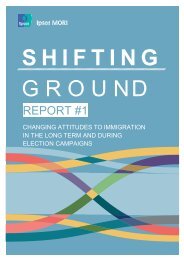You also want an ePaper? Increase the reach of your titles
YUMPU automatically turns print PDFs into web optimized ePapers that Google loves.
When Mohammed Siddique Khan referred to ‘my people’ he was not talking<br />
about his fellow countrymen in the UK. He was referring instead to a politicised<br />
notion of the global community of Muslims known as the ummah. For Islamists,<br />
ideas such as loyalty, identity and allegiance are framed by the fraternity of faith<br />
– not geography. Unanchored from territorial boundaries, this worldview seeks<br />
to unite Muslims globally on the basis of their confessional identity, overriding<br />
(and in many cases, negating) every other aspect about their person. The<br />
nation-state and its associated nomenclature is therefore an artificial and<br />
contrived unit devoid of legitimacy. It follows <strong>that</strong> if individuals feel distant –<br />
and in some cases disconnected – from the state, then they are less likely to serve<br />
it. That message of <strong>sep</strong>aration and confrontation is what led Mohammed<br />
Siddique Khan and his accomplices to betray their country. The skewed inversion<br />
of their loyal<strong>ties</strong> and responsibili<strong>ties</strong> was confirmed by his suicide video in<br />
which he declared: ‘I am directly responsible for protecting and avenging my<br />
Muslim brothers and sisters’. 274 The terrorist attacks he led were the natural<br />
outgrowth of <strong>that</strong> politicised ‘ummah consciousness’ which has spread unchecked<br />
in many parts of the Muslim community.<br />
The word ummah itself appears in the Quran and linguistically means ‘nation’ or<br />
‘community’. The reformist Indian scholar of Islam, Asghar Ali Engineer, has<br />
shown how this idea has traditionally been understood broadly, referring to any<br />
kind of community – religious, geographic, racial – and insists <strong>that</strong> it can even be<br />
applied to classifications within the animal kingdom. 275 He explains:<br />
[...] it is only in [the] spiritual and religious sense <strong>that</strong> Muslims can be described as one ummah,<br />
not in [any] political sense. In [a] political sense Muslims constitute [an] ummah <strong>sep</strong>arately in<br />
every country along with others, may they be Hindus or Christians or Buddhists. 276<br />
Arguing <strong>that</strong> the ummah should have primacy over everything else has far-reaching<br />
consequences. It does not just mean <strong>that</strong> Muslims develop extra-territorial<br />
allegiances in foreign conflicts, but <strong>that</strong> there are also strict limits to their Britishness.<br />
Addressing a conference on the theme of ‘Justice: A call to humanity’, the former<br />
spokesman of the Muslim Association of Britain, Azzam Tamimi, declared:<br />
I don’t ever believe <strong>that</strong> there is something called European Muslims. We are Muslims in Europe<br />
not European Muslims. We have an identity, we have our aqidah (Islamic creed), we have a<br />
shariah (law) and we have an ummah <strong>that</strong> we are proud of. 277<br />
The difference between being a ‘European Muslim’ or a ‘Muslim in Europe’ may<br />
appear merely semantic – but its implications are profound. Tamimi tells his<br />
audience they should only consider themselves as ‘Muslim in Europe’, because he<br />
advocates adherence to a <strong>sep</strong>arate identity, allegiance, belief and even law. That<br />
message estranges its adherents from the prevailing climate of normative British<br />
values today.<br />
Indeed, in its more extreme manifestations, this politicisation of the ummah<br />
may not entail simply embracing a metaphysical identity <strong>that</strong> is decoupled from<br />
geography, but may also involve adopting the associated nomenclature of<br />
assorted Islamist values <strong>that</strong> come with it. Attaching political allegiance to the<br />
ummah in this way is inherently bound up with a much broader Islamist<br />
Bri�sh Muslims and Barriers to Entering the Armed Forces<br />
274 Ibid<br />
275 Asghar Ali Engineer, Essays in<br />
contemporary politics of identity,<br />
religion, and secularism (Delhi,<br />
1999); The origins and<br />
development of Islam (Kuala<br />
Lumpur, 1990); and The state in<br />
Islam (particularly chapter 2)<br />
(India, 2006)<br />
276 Asghar Ali Engineer, ‘The<br />
political universe of Islam’.<br />
See: http://andromeda.rutgers.<br />
edu/~rtavakol/engineer/politics.<br />
htm<br />
277 http://www.islamicforum<br />
europe.com/live/ife.php?doc=arti<br />
cleitem&itemId=327<br />
policyexchange.org.uk | 61



